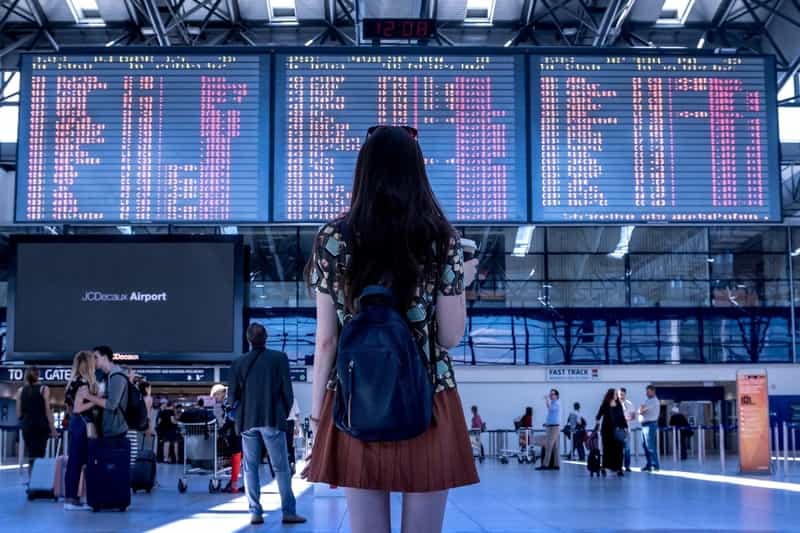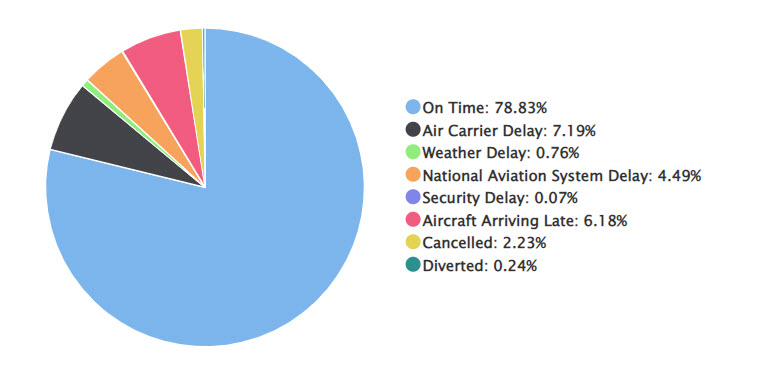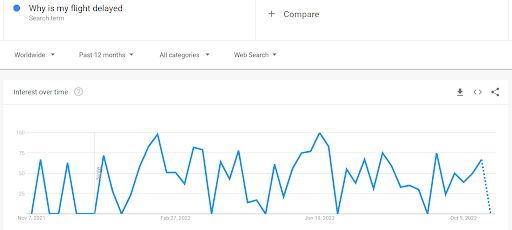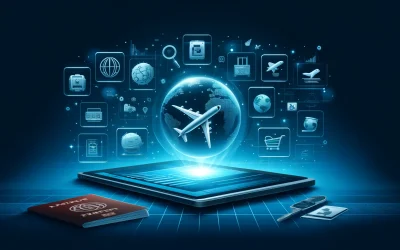If you’re a frequent flyer, chances are you must have faced a flight delay at least once in your life.
If you have faced such mishaps, you could be entitled to flight delay compensation under EU law. It’s not like the airlines don’t have a maintenance budget for planes, staffing issues, or have a flight attendant and pilot shortage.
The truth is that many times in the airline industry it is beyond anyone’s ability to do anything.
In this article, we look at the major reasons “why do flights get delayed” and, as U.S. air passengers, what you can do about such consequences.
Why are flights delayed?
If a flight arrives 15 minutes later than the scheduled time, it is considered delayed.
When you check the airlines’ websites, they have broad categories for delayed flights. Usually, they prefer to keep it discreet and avoid giving details about the delay to the passengers.
There are several reasons why they do that.
For instance, if they tell flight passengers that the delay is because the pilot is late, it will irritate the passengers. This is why they mostly use the term ‘operational reasons.’
However, airlines are obligated to report it to the BTS (Bureau of Transport Statistics).
Let us see the flight performance statistics on domestic and international routes from January 2021 to August 2022.
Source: Bureau of Transportation Statistics, Airline Service Quality Performance 234
There are a variety of reasons that the airlines officially categorize a delay;
Air Carrier Delay
There can be many circumstances where airlines make last-minute decisions by changing the time, date, and terminal of departure or arrival.
In such instances of flight delays or cancellations, airlines are responsible for the inconvenience caused to the passengers.
National Aviation System (NAS)
Heavy air traffic, traffic control, and airport operations are monitored by the NAS, which can sometimes delay flights.
Interestingly, according to the BTS, most flight delays are caused by airlines, while the least number of delays are due to poor weather conditions.
Note: Delays due to maintenance might take up a few hours, but bad weather delays can last days.
Non-Weather Related Delays
Usually, when you try to find the reason for flight delays, you get vague responses like “operational reasons” or “technical reasons” and that’s not all of it.
Ever wondered at the airport “Why does the flight information display show all the airlines delayed?”
Here are the Top 13 reasons why flights are delayed
- Air Traffic Congestion
- Technical Problems
- Due to Medical Emergency
- Due to Airport Emergency
- Flight Crew Fatigue
- Delays by Passengers
- Delay in loading cargo
- Delay in catering services
- Bird aircraft strike hazard (BASH)
- Holidays! Of Course
- Summer flight delays
- Monsoon flight delays
- Winter flight delays
1. Air Traffic Congestion
On average, 8 million passengers fly every day. That’s over 3 billion a year. Every Domestic and International airport is prone to Air traffic congestion once in a while.
And cities like Chicago, Los Angeles, New York, Frankfurt, Delhi, London, and Paris have the most realistic air traffic. It shouldn’t be surprising if your flight gets delayed or canceled once in a while.
Flight delays are a given in such immense air traffic, especially for longer flights since these are subjected to stricter regulations.
Airport equipment such as radar is crucial for the movement of planes. Not all parts of the world have airport tech as in the US and Europe.
Sometimes, to ensure safe landing and take off, regular maintenance and equipment testing is carried out at the airports which take up more time than usual. And one delayed flight or a missed approach can cause a chain reaction of delayed or canceled flights.
An event like this falls under extraordinary circumstances. The airlines are not responsible for such delays.
2. Technical Problems
It’s one of the most common reasons for flight delays. However, try not to be too judgemental. As annoying as this excuse of ‘technical problems’ is, such a delay might even save your life.
Technical snags are defects that can make your aircraft not airworthy. In such cases, there are last-minute equipment changes done by the airline which is a time-consuming task if there are no aircraft available to fly or in ready-to-fly condition.
Safety first!
Suppose an airline is taking up time to double-check the aircraft’s condition. More power to them because the alternative is dark and full of terrors.
Yes, we have much more advanced technology in the 21st century, but technical defects happen.
Forget airline companies; even NASA faces technical problems regularly.
Whenever there is such a technical issue, it needs to be rectified and adequately documented. Strict protocols need to be followed, which might take up time and cause delays.
Regardless, the maintenance of planes needs to be efficient. The airline is responsible for it.
3. Flight delays due to Medical Emergency
Aircraft is one of the safest modes of transport. Medical emergencies onboard any aircraft are quite common. It may not happen on your flight but many aircraft are flying in your vicinity.
Your flight may get delayed due to some other flight declared emergency, the air traffic controller has put their flight on priority and yours on hold.
4. Flight delay due to Airport Emergency
Just like medical emergencies, Airport emergencies are the top priority when it is emergencies like Aircraft Emergencies, dangerous goods occurrences, fires, or smoke at the airport.
Such incidents may lead to flight delays, flight cancelation, or diversions to different airports for safety reasons.
5. Flight Crew Fatigue
Airlines follow protocols that ensure that their crew gets plenty of rest before each flight. This is part of the flight crew fatigue management routine and it’s very crucial for everyone’s safety.
Naturally, sometimes the crew is short, and some members fill in for others. After back-to-back flights, the airline might need to rest them to save them from exhaustion.
Remember, the margin for error is minimal in aviation operations.
6. Delays by Passengers
When you hear the airport announcer calling someone’s name for the fifth time, they are probably waiting for connecting passengers. The airport staff hates it as much as you do but they have to follow protocol.
Sometimes, the luggage has been checked in, but its owner is missing. That’s a liability at the airport, to find the owner or unload the luggage. The airport staff is actually trying to help this person.
Talking about help, sometimes passengers face medical emergencies, which can create serious problems for everyone involved. The crew has to handle such situations which can cause flight delays.
7. Delay in loading cargo
Cargo sometimes can arrive later at the airport. The loading process may begin after you have boarded the plane. And there is a lot of it, so it may take a while.
8. Delay in catering services
Caterers load the food onto the plane. However, the catering truck delivering the food might get lost on its way to the gate.
9. Bird aircraft strike hazard (BASH)
Aircraft and Birds are prone to collide with each other regardless of what altitude they are flying. This poses a serious threat to the aircraft and wildlife putting the life in danger for both the passengers and birds. Such accidents can bring delays in flight operations. Sometimes it can be fatal.
10. Holidays! Of Course
More people travel around in summer, which means more passengers and congestion at the airport, longer boarding time, and longer unloading of luggage. In short, the plane takes longer to take off.
Weather Related Delays
11. Summer flight delays
The general perception is that snowy winters are the main culprit of weather-related flight delays. But the reality is that there are more flight delays in summer than in winter.
There are more Google searches for “Why is my flight delayed?” in Summer than in any other season.
Source: Google Trends
Let’s see why that’s the case;
Hot air makes lift-off difficult
Hot air is less dense, making the wind under the wings sparse. The result is that the plane needs more runway space to achieve lift-off speed. And clearing the runway for extra space can cause delays.
Windshear
What may look like a normal cloud from the ground is dangerous for airplanes flying in the sky. Wind shears are dangerous. It is a pocket of a sudden shift in wind direction and velocity.
Pilots typically don’t prefer to land or take off with this in their path, hence conditions in such weather flight delays happen.
Sand and Dust storms
Dust storms or Sandstorms frequently occur in summer. Such incidents can put a halt on airport operations for a brief period of time.
Pilots approaching the runway may find it difficult to land as the runway visual range (RVR) will drop below the minimum required visibility for landing. These are dangerous situations where aborting a landing is the best option.
Monsoon flight delays
June and July are the peak months for flight delays. Rain and thunderstorms during these months, a.k.a ‘convective weather’ stretch flight duration. While flying, when the pilots approach such a weather patch, they try to avoid the weather.
Microburst, Thunderstorms with heavy rain (TSRA+), and dense fog results in poor visibility. In such scenarios, the runway is completely wet or even flooded making the runway inoperative.
In the air, it’s the pilot’s call whether to land or abort landing or use a diversion. Whatever suits the best for everyone’s safety.
While on the ground the airport may completely shut down if the bad weather conditions are not favorable.
Winter flight delays
If you mention a flight delay to someone due to extreme weather, pictures of hail, snow, and fog immediately come to mind.
Airline Snow: Airport runway is considered contaminated when there’s standing water, snow, ice, or slush, which needs to be cleared before landing or takeoff. Otherwise, while landing or taking off, the plane could lose traction, which leads to aquaplaning/hydroplaning.
Some airports may face heavy snowfall, Black ice formation is nothing new in winter. For normal eyes, the tarmac may look wet but in actuality, there’s a thin layer of ice covering the surface which blends in well with the color or tarmac making it look like a normal road.
This situation is particularly dangerous since the aircraft can lose traction or worse slide on its own. This results in more canceled and delayed flights.
A small snowstorm without any accumulation is generally not an issue. But if an airport does not typically deal with clearing snow, then even a mild storm can cause delays. Also, thunderstorms and blizzards can cause visibility problems, hail storms can physically damage the aircraft. Irrespective of the airport’s preparation, a delay is usually imminent.
High Wind and Gusts: Even when it’s not snowing, high winds can cause pilots’ visibility problems.
Crosswinds during flights are generally not a problem but landing and take-off are riskier; airlines might have to cancel or delay flights if snow is drifting or blowing.
High winds usually don’t cause delays, but if there is ice on the tarmac, these winds can be dangerous, which may cause tarmac delays.
And lastly, the strong winter winds called the ‘bomb cyclone’ are powerful enough to cause extreme turbulence, which causes flight delays.
Aircraft Icing: Ice can form on the plane, which can create mechanical problems. Airplanes are prone to such problems. Ice forming on airplanes’ wings and windshields is a serious problem and needs to be addressed.
Depending on your location, airports with heavy traffic and lesser de-icing equipment may take longer than usual to get your aircraft de-iced. Usually, in peak hours there can be a long queue of aircraft waiting to be de-iced. Thus further increasing the chances of your flight delays.
What should you do when your flight is delayed?
The majority of air travelers are unaware that they have certain “air passenger rights” and privileges they can use when such a mishap occurs.
In an apples-to-apples comparison between E.U. and U.S., EU air passengers have more privileges.
For instance, if a flight is delayed in Europe for more than three hours, the passengers are entitled to delayed flight compensation.
If the same happens to a flight in the US, you cannot claim compensation. However, if the delay is unusually long, you might ask the airline for free meals or even a hotel stay if there’s an overnight delay.
But bear in mind that the law does not obligate them to do so. They are required, however, to update the flight status within 30 minutes (or sooner) after becoming aware of the delay.
Refund is a Grey Area in the United States
What if your flight is significantly delayed?
According to the United States Department of Transportation (U.S. DOT), you might be eligible for a refund, including all paid fees such as baggage fees or seat upgrades if the delay is unusually long.
However, DOT has not defined a ‘significant delay.’ DOT determines if a request is eligible for a full refund on a case-by-case basis, after checking the duration of the delay, the passenger’s circumstances, etc.
European Privilege for U.S. Air Passengers
There are certain conditions when U.S. passengers are entitled to compensation for delayed flights on international routes.
- Your flight should have been delayed for more than three hours at the final destination.
- Your flight should have departed from an EU airport, or you must have traveled with an EU-regulated airline to an EU airport.
- The flight disruption shouldn’t be due to reasons beyond the airline’s control.
For example, if your flight is delayed for more than three hours due to an airline’s fault while flying from New York (or anywhere in the world) to Paris (or any EU airport), with Lufthansa (or an EU-regulated airline), you are eligible for compensation of up to 600€ (i.e., about $700), the same way as European passengers do.
To claim flight delay compensation, you may reach out directly to the airlines’ customer service or the travel company you booked your ticket with, or flight delay claim companies (probably for a fee of up to 50%).
I hope you enjoyed the article “Why is my flight delayed”?
Pramod Ram
Digital Marketing Strategist
Pramod Ram heads the Online Marketing and Content Marketing Team at Claim Flights GmbH. He loves to travel, read books, watch movies and do intensive research.
If your flight delays for more than 3 hours, or was canceled, you may be eligible for compensation up to €600 based on EU 261 rule.
Check For FreeWe offer "No Win - No Fee" Services, so claiming is Risk-Free!
10 best flight-booking sites of 2024
Are you searching for the perfect flight booking portal to snag the cheapest airfares for your next trip? You're not alone. Today, the internet is flooded with options that claim to offer the fastest and most cost-effective booking...
Top 10 Most Beautiful Places In The World To Visit In 2024
When it comes to the world, the place is one of the most beautiful arenas. The most amazing places in the world allow you to set your foot in the world to enjoy the view of the world. In this blog, we have brought for you the top 10 most...
Flight Delays Due To Technical Problem
When Technical Glitches Ground Your Plans: Flight Delays Explained Flight delays can be incredibly frustrating, especially when they disrupt carefully planned itineraries and cause inconvenience to travelers. While various reasons can...






